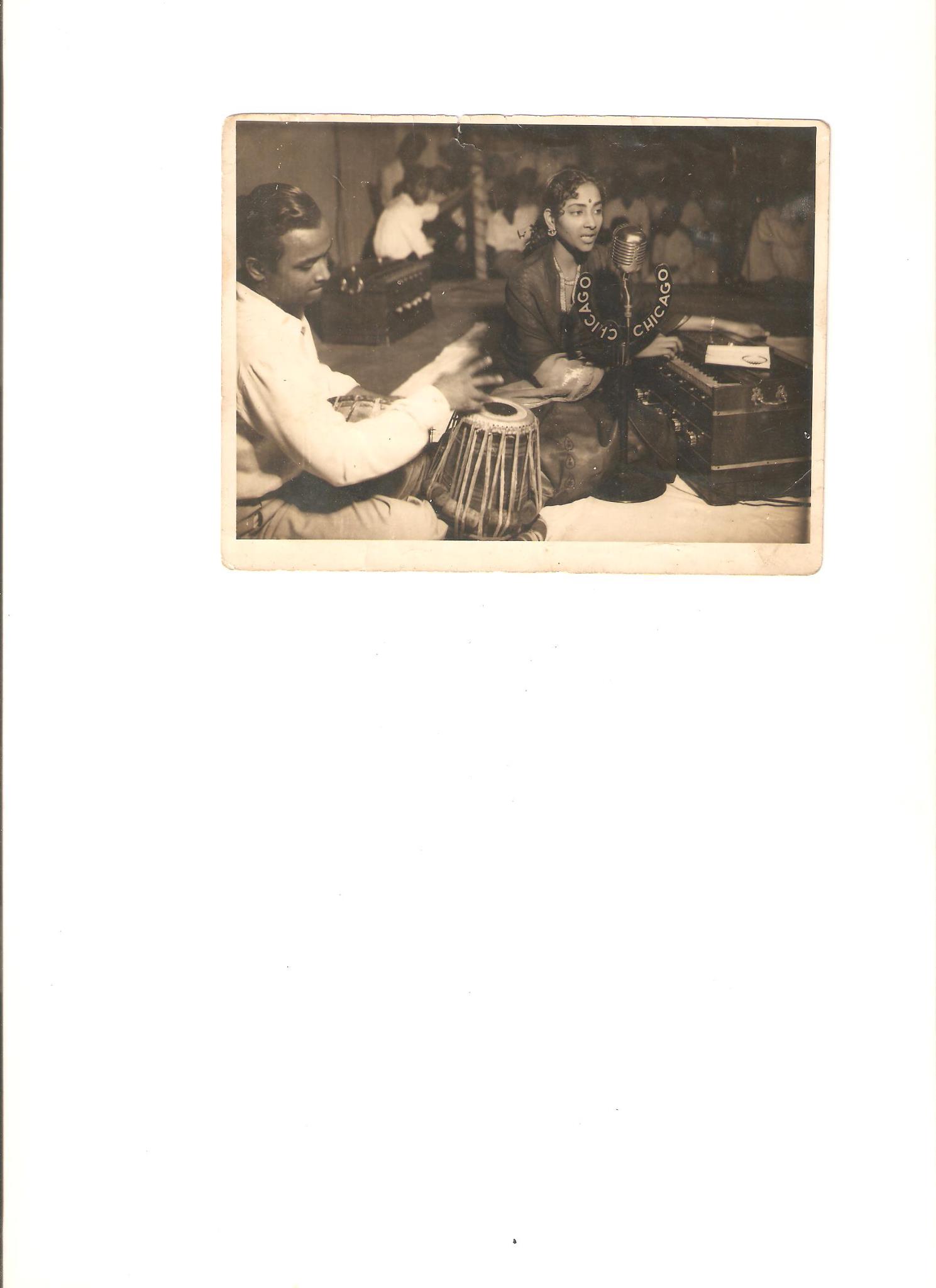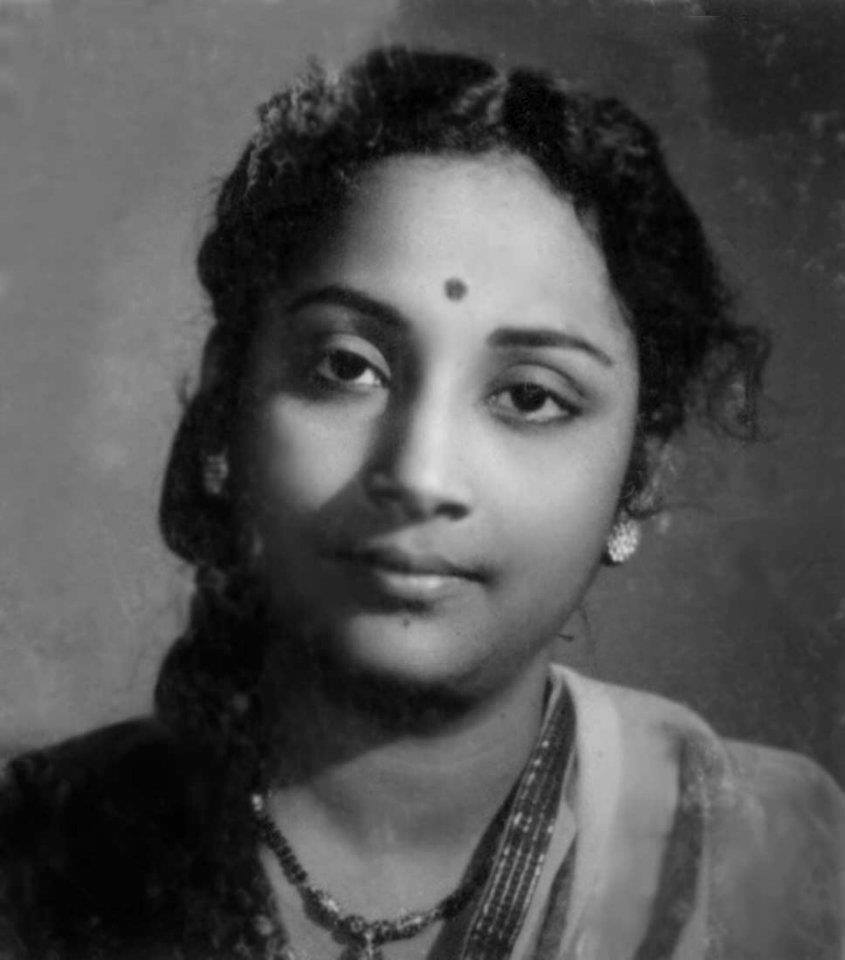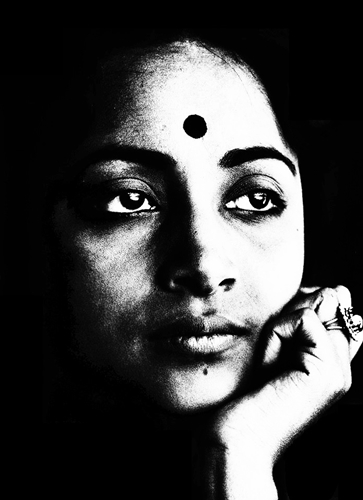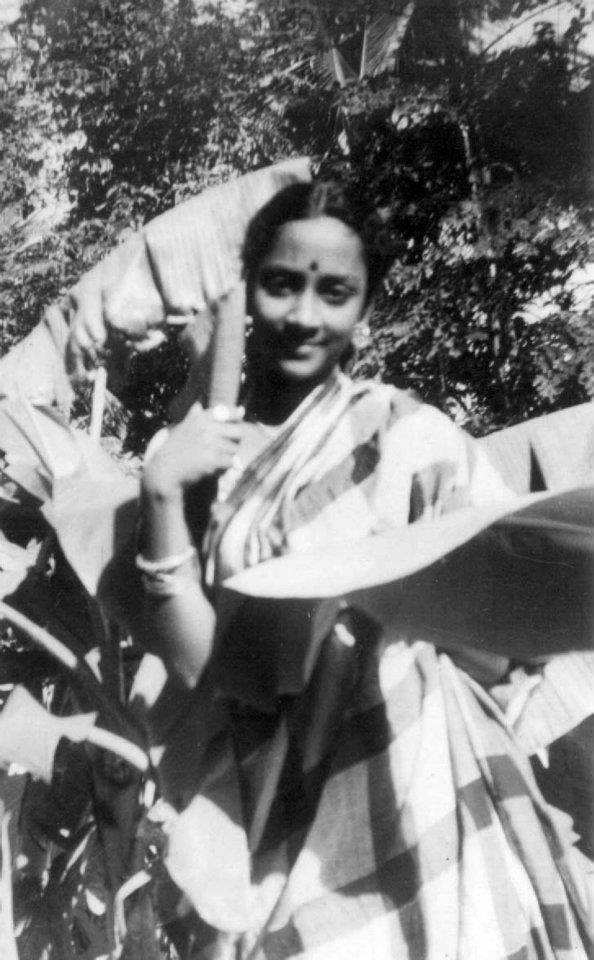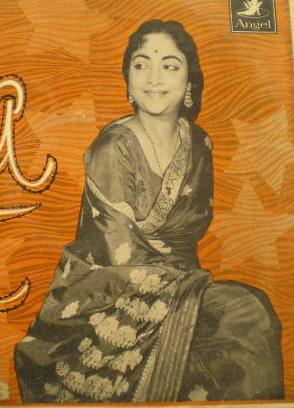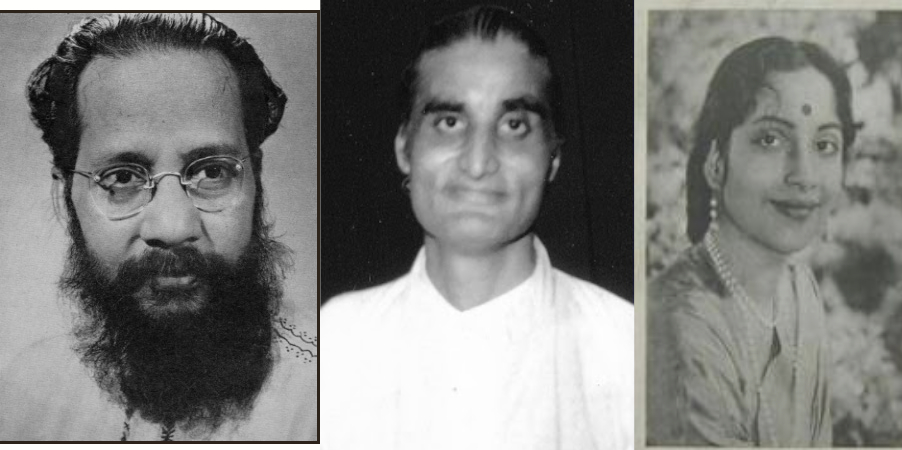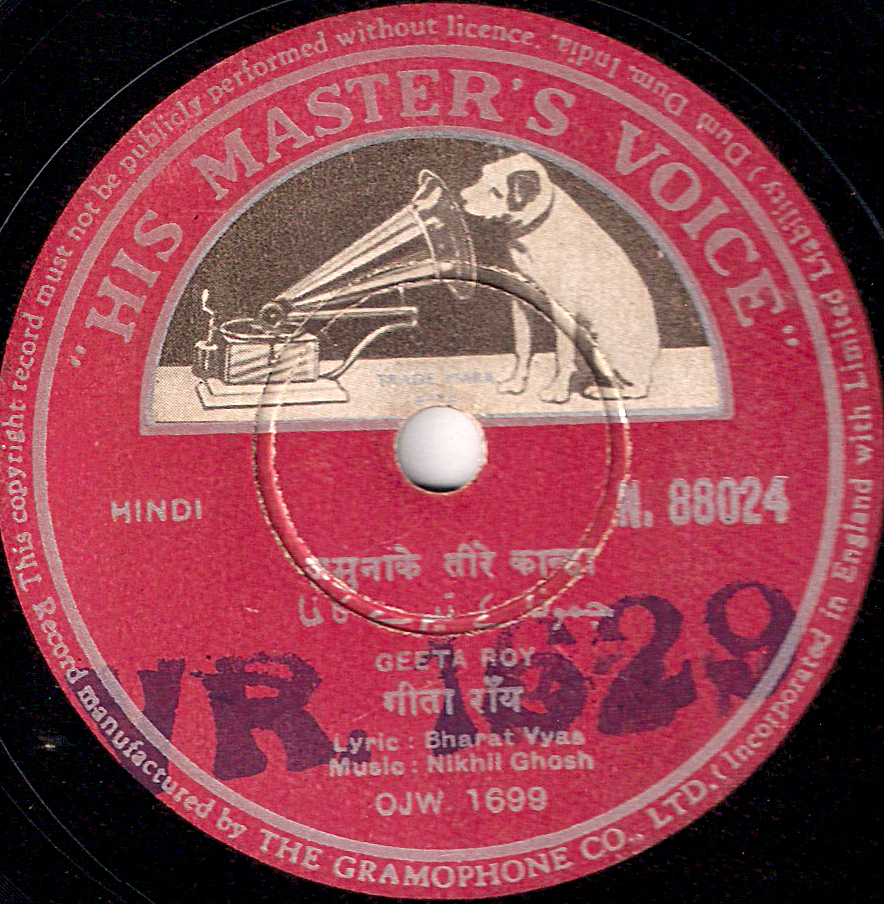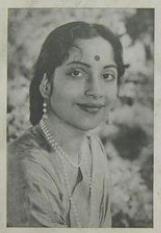
Geeta Dutt is a singer I never thought about as I was growing up. My familiarity with her was fairly limited – I was most familiar with her work for her husband’s films and to my childish mind, I had her firmly pegged her into “rota-dhota” slot with songs like “Na jaao saiyyan “, “Waqt ne kiya kya haseen Sitam”, “Koi door se aawaaz de”, “Preetam aan milo”, and even “Aaj sajan mohe ang laga lo” as “proofs”! Of course, I was also aware of her other popular numbers like “Babuji dheere chalna”, “Hum aapki aankhon mein”, “Piya aiso jiya mein”, “Jaane kahan mera” but for some reason, her sadness is what stayed with me far more. Even the night club singer image did not penetrate my “impressions” till much later.
It was much later that I actually had the chance to listen to her wide range of songs and realized the vast variety in her repertoire – frankly a journey of discovery and wonder that still continues. A few things have stood out for me from time to time about her singing. For one, her voice has a curious innocence to it, no matter what she sings, even the so called night club songs, she seems to have an undertone of innocence. Sometimes it is just like a young girl dressing up in mommy’s clothes to appear too grown up and it is just as endearing. Even when she injects oomph into a number, it never appears overdone and I credit this undertone of innocence for the same.
The second striking quality to her singing is the inherent emotion that comes across so loud and clear. And in that respect, her range is endless. Whether its raw grief of a separated lover, wild exuberance of youth, unrestrained joy of a woman in love, a mother’s adoration for her child, hesitant exploration of a taboo emotion, wistfulness or yearning, whimsical self-exploration, selfless devotion, or even the unabashed titillation – she consistently delivers the right emotion with the appropriate amplitude as per the demand of the song. Today, it is this aspect of her singing that I would like to explore a bit with examples from some of my favorite Geeta Dutt Solos. I was asked to stay in the realm of Non-Guru Dutt movies so that is what I have tried to do for the most part. Also, I have never seen the picturization of some of these songs so my comments are purely based on what I hear in the lyrics and singer’s expression.
Finally, and this one is purely personal to me and somewhat related to the last one, a good reason why her songs resonate with me is that for many of her songs, it seems to me that she is singing about her own life and her own circumstances. The singing is straight from the heart and the mood and tone of songs match what I imagine the joys, sorrows and travails of her life would have been at different points. She is a woman who experienced a lot in life and I think her experiences reflect in her singing and serve to heighten the emotional content – appeals to people like me who shoot straight from the gut…
Now, without any more ado, let us delve into many moods of Geeta Dutt…
1. Sad –
To me, Geeta Dutt was a total queen of sad and unbearably tragic songs. The impression sure has a lot to do with the early exposure but the number I have chosen today is a song with a relatively unknown composer for an unreleased film and it is my absolute favorite song of this composer. Yes, its Daan Singh’s composition for unreleased film “Bhool Na Jaana”. Hearing this song is pure heartbreak. The pathos in her rendition is unbearable, one can almost imagine it being filmed on a dying woman whose only desire is to be held by her separated lover/mate for one last time, but this is likely a woman who realizes that this wish will probably remain unfulfilled. Dr. Hariram Acharya’s words simply come to life and when she mouths
ये तेरा मिलन ये तेरा क़रम, है मुझे हयात से कम नहीं
तू है सामने तो मेरे सनम, मुझे मौत का भी अलम नहीं
You so totally believe her …
The second song in this category is from Detective, a 1958 release, penned by Shailendra and composed by her brother Mukul Roy. This is a song that falls in the third category for me – it always seems that GD is pouring her own heart out and recounting her own life. She simply seems to live it and you hear it clearly. As she mouths the words, one can map them to what one imagines her life must have been
दो चमकती आँखों में कल ख़्वाब सुनहरा था जितना
हाय, ज़िंदगी तेरी राहों में आज अँधेरा है उतना
हम ने सोचा था जीवन में फूल, चाँद और तारे हैं
क्या ख़बर थी साथ में इनके काँटे और अंगारे हैं
हम पे क़िस्मत हँस रही है कल हँसे थे हम जितना
इतने आँसू इतनी आहें दिल के दामन पे लेकर
जाने कब तक चलना होगा सूनी सूनी राहों पर
ऐ मुक़द्दर ये तो बता दे मुझको सहना है कितना
2. Happy and Carefree
My absolute favorite Geeta song in this genre is the Mr.&Mrs. 55’s lovely solo “Thandi Hawa, kali ghata aa hi gayi jhoom ke” but the song I have chosen for this article is technically a duet with Asha Bhonsle but is practically a solo as Asha only hums a little. It’s the forever fresh, buoyant, pristine song from Sujata that takes one back to those “Bachpan ke Din” in a jiffy. And Geeta Dutt sounds so angelic, almost celestial under S.D. Burman’s baton for “Sujata” with the childlike innocence coming across so clearly.
3. Sweet and Romantic
I have two songs for this category. My first pick is “Tan man mera tarse” from 1952 movie Paataal Bhairavi. I really like this song mostly for the rendition. GD’s voice rings out crisp, clean and pristine. It has none of the full throatedness or oomph. Here again she worked with a gentleman who does not have a vast repertoire in HFM as MD but this song with Geeta Dutt is simply breathtaking. Ghantshala is the MD and Pt. Indra is the lyricist.
The second one is a more typical representative of GD’s romantic solos – playful, bubbly, quixotic and utterly enchanting. “De Daalaa, Dil De Daalaa” from Musafirkhaana penned by Majrooh and composed by OPN fits right in that mould.
4. Devotional
Now GD has a wide range of work in this genre – a lot of her work in the 40s was for mythological films and those gave her ample scope for devotionals. The crown jewel for her in this respect is the soundtrack of Jogan . Here it is a toss-up between “Ghoonghat ke pat khol” and “Ae ri main to prem diwani…” and the later is my pick today – simply because it’s a more versatile bhajan that can be taken in non-Godly context also and simply describes a woman’s yearning perfectly. While the singer can claim no credit for the words, that belongs to another remarkable lady, her rendition does make this bhajan memorable. And though I have heard various versions of this bhajan, this rendition remains my favorite and is inevitably the first to come to mind. Again, GD’s voice rings out pure and clear but with an undefinable extra element – not exactly pain but something akin to it that makes its sound like a song of yearning but with a calmness to it that keeps it firmly in the devotional range. Bulo C. Rani is the MD here with poetry credited to Meera Bai.
5. Comic or ridiculous
I think some of the best work Geeta Dutt has done in this genre is reflected in her duets – those with G.M. Durrani and perhaps S.D. Batish are prime examples of it – that is where her sense of comic timing and extreme playfulness comes into play. But today, we will restrict ourselves to solos, so in this category, my pick is this delightful song from “Darogaji” that is outwardly a simple fun song but is actually also a political comment on corruption in public service (but that is the lyricist’s credit and is material for another discussion, another day ☺ ). This one is penned by Manohar Lal Khanna and composed by Bulo C. Rani
6. Motherly Love
While GD has a few loris to her credit, the one that comes to mind first is always the Sujata song. In fact, talk of loris in general in HFM and this one is bound to figure amongst the top few. Here you hear none of the exaggerated oomph which Geeta Dutt is often associated with – you simply hear a mother’s love for her child flow and the rendition is suitable toned and aptly “innocent”. Again this one has Geeta singing Majrooh Sahib’s words under S.D. Burman’s baton.
7. Wistful or yearning
Here is a genre that GD simply ruled, imho, just by virtue of her voice quality, especially in the later years of her career. Every time I listen to songs like “Meri jaan, Mujhe jaan na kaho…” or “Koi chupke se aake”, or even “Koi door se aawaaz de chale aao…”, the primary emotion that I hear is that of dreamy, wishful yearning though the underlying flavor varies a little in each case from reflective to melancholy. My pick for this genre today is “Aaj Ki kali ghata, mast matwaali ghata…” from Uski Kahani – interestingly, majority of the songs that came to mind today are tuned by Kanu Roy so may be it’s the MD’s magic also that is responsible for bringing out this facet of GD’s singing. Now I have no clue as to what is the story of this movie, how the character fits in and what is the situation of this song but as I listen to her mouth the lyrics penned by Kaifi Azmi (which are excellent in their own rights and certainly are my clues to the rest of the rambling ☺ ), I get a strong feeling that this is a character on the brink of admitting / acknowledging or responding to feelings that are somehow taboo. Now can’t say in what way – may be this is a bored/abused wife on the brink of infidelity, or maybe she is a widow for whom this admittance is prohibited (yeah, I am, prone to being fanciful) or may be there is a third very different cause but the uncanny feeling I get is that this song is about a love pleasurable yet forbidden in some way. As the mukhda starts, and one hears
आज की काली घटा, मस्त-मतवाली घटा
मुझसे कहती है कि प्यासा है कोई
कौन प्यासा है, मुझे क्या मालूम
We know right away, this one is about a newly-blossoming or just budding relationship as opposed to an established one and note the slight hesitation in “Kaun pyaasa hai” and “mujhe kya maloom” – as if maaloom to hai par kah nahin sakti (and its she herself too). The antara of course, is what first brings in the feeling that this is a relationship that has some contentions and lyrics play a major role but her intonation also brings out the struggle – hear the “Kyun samaayaa hai koi” and note the stress on “kyun” and it is clear that while the feelings are there, she is not comfortable at all with them
प्यास के नाम से जी डरता है
किसी इल्ज़ाम से जी डरता है
शौक़-ए-बदनाम से जी डरता है
नीची नज़रों में समाया है कोई
क्यों समाया है, मुझे क्या मालूम
Moving on to the next antara, the forbidden fruit feeling just gets stronger – falling in love is like “ladkhadaana” and may be her non-responsiveness is the “bevajah shikaayat”, may be not. Aur koi dil kii dahleez tak hii aayaa hai, dil mein nahin – again lyrics and delivery are so in sync, she seems to feel what she is singing.
प्यासी आँखों में मुहब्बत लेके
लड़खड़ा जाने की दावत लेके
मुझसे बेवजह शिकायत लेके
दिल की दहलीज़ तक आया है कोई
कौन आया है, मुझे क्या मालूम
Now this next one is where the tone changes – both in lyrics and a little in the rendition also – there is a hesitant admission that this is pleasurable (clearer in lyrics) emotion but there is an underlying wistfulness (much more in the rendition) also as if she wishes this was more acceptable or that she was free to admit her feelings openly – that there was no fear ki koi afsaanaa na ban jaaye – and that tone gets stronger in the in antara after too.
कुछ मज़ा आने लगा जीने में
जाग उठा दर्द कोई सीने में
मेरे एहसास के आइने में
इक साया नज़र आता है कोई
किसका साया है, मुझे क्या मालूम
ज़िन्दगी पहले ना थी इतनी हसीन
और अगर थी तो मुझे याद नहीं
यही अफ़साना ना बन जाये कहीं
कुछ निगाहों से सुनाता है कोई
क्या सुनाता है, मुझे क्या मालूम
Now of course, all of the above is what I hear and is pure speculation – the actual use of the song may be really very different but the song is a pleasure to hear and a lot of it is on account of the singing.
8. Whimsical
This is a strange category and not too many songs would be generally placed in this one. My prime example is the Anubhav song, penned by Gulzar and once again tuned by Kanu Roy. This is a song that has minimal orchestration and GD simply carries it on the strength of her voice. It is a song of a woman’s self-exploration, a song of what if’s – so wonder and reflection underlined with both a mild regret and a strong sense of relief and GD’s rendition reflects all these feelings appropriately at the apt time. I’ll leave a detailed stepping through for another day…
9. “Night Club” songs
This is supposedly the genre that Geeta Dutt is most identified with. To my mind this one is remarkable on account of her amazing ability to infuse these so called Club songs with a plethora of different emotions. On the surface, they all are the seductive, come hither ones but some of them just surprise you with an undertone or overtone that seems to indicate something different. Also noticeable is that innocence, that first quality of her voice in some of them. Some sure have an exaggerated oomph to them but most are very tastefully executed (and I mean singing – no comments on any picturization – haven’t seen many nor do I really want to in some cases). I will go into what I call special cases in this category and will largely ignore the majority of regular club songs.
First set of songs in this category are ones that I believe are likely filmed on a second lead, perhaps of dubious character but sure a woman who is in love with the man she is singing for – these don’t seem to be undirected at all. A prime example, imho, is “Mujhe huzoor tumase pyar hai…” from Son of India, composed by Naushad and penned by Shakeel Badayuni.
The full audio (including the stanzas from the film soundtrack and the 78 rpm record) is available here
The second category is that of songs that pack a philosophical / meaningful punch under the guise of being a club song – two examples here – note the seemingly gay abandon along with the tone of challenge in the first and pay attention to the slight undertone of regret – It is a Madan Mohan – Rajendra Krishan combo from Pocketmaar and makes me wish that the lady had heard herself and taken her own advice – we would have likely had much more music from her to enjoy.
Next one is another Madan Mohan – Rajendra Krishan combo, this time from Chandan. Again a song that is overtly an invitation but hides some philosophy (on part of lyricist) and perhaps regret and fear masked as carefree abandon (on part of the singer)
Final subcategory in this category are songs that are songs that are curiously innocent despite there come hither lyrics – are not really club songs but have the flavor of them too. Here my pick is this lovely Milap (1955) number which I had never seen till a few months ago though I had heard it innumerable times and pretty much “knew” it. I did not know that it was picturized on Geeta Bali but if I had to guess, she would have been my first guess. I also did not know where it was picturized – for all its overt sensuousness, it had undertones of innocence and naughtiness that made it unsuitable for a club like setting, the overtones and the lyrics certainly carried a suggestiveness (note the chutkis for effect :-)) that ruled out a simple picnic or song sung by a traditional “heroine” of the movie. The song strongly suggested that the character lip-synching this must have some shades of gray, can’t be a ‘holier than thou’ leading lady, nor should be an outright vamp (though that is more possible as this lady is out to seduce). My guess prior to watching the song was a kind-hearted gangster’s moll is likely, possibly trying to entrap an unsuspecting or even disguised hero. A later viewing confirmed its partial correctness. This time yrics are by Sahir and MD is N. Dutta
Acknowledgements:
We are grateful to our dear friend Archana Gupta for this wonderful tribute to Geeta ji on her death anniversary today.

